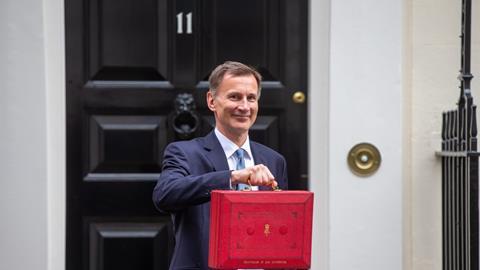As the haulage industry braces itself for the Spring Budget, which will be announced on Wednesday (6 March), fuel duty and VED are key policies that could be in the sights of Chancellor Jeremy Hunt.
The Institute for Government is predicting that fuel duty is the most likely candidate for a tax cut in the Spring Budget.
The independent think tank said: ”Fuel duty is supposed to increase by 5p per litre on 23 March and then there is due to be a further inflationary increase in August.
”Given that these would be the first fuel duty increases enacted since January 2011, it seems likely that Hunt would include a further extension of the 5p fuel duty cut and cancellation of the inflation uprating in any package of tax cuts.”
Both the RHA and Logistics UK reiterated their calls this week for the Chancellor to maintain the current 5p per litre cut in fuel duty to protect hauliers from the continuing strain of increasingly narrow margins.
Other key demands from RHA include the temporary suspension of Vehicle Excise Duty on HGVs and the HGV Levy; an emissions-linked rebate on fuel duty on alternative fuels; an essential user rebate on fuel duty for commercial operators; and reform of business rates to support transport businesses operating warehouses.
Last year the RHA found that operating costs, excluding fuel, for a typical 44-tonne HGV increased almost 10% whilst the freight volumes decreased by 10%. This is on top of a 20% increase in 2022.
It warned: ”Rising costs and complicated regulation has resulted in record numbers of hauliers going insolvent. In the previous 12 months alone more than 450 businesses in this sector collapsed, more than double the number a year prior. This is not sustainable, and the industry needs support.”
Paul Holland, Fleetcor UK/ANZ managing director, said this week that the Spring Budget should offer incentives to help fleet operators make the switch from diesel to cleaner forms of energy but added that he did not hold out much hope that this will happen, particularly as the current government will be looking to offer short term benefits to win votes in the upcoming General Election.
He commented that ”significant parts of the UK’s fleet of smaller vehicles [are] running on electric drivetrains thanks to tax incentives, grants and loans for EVs.
”If something similar could happen for larger vehicles, then UK businesses could potentially save millions on fuel at a time when the logistics and haulage industry is suffering. Those savings would be passed on to retailers and consumers.”
“I wouldn’t advise haulage firms to hold their breath on this. This may be the last budget before a general election, so I doubt the current Conservative government is going to commit to a major, green energy initiative into the transport space rather than go for short term incentives that might show favour with the electorate.
”Getting the UK’s transport system up to speed, whether that’s filling in potholes or building 21st century HGV infrastructure, doesn’t fulfil either need, even though it would have tangible benefits to literally everyone in the UK and create thousands of new high-tech jobs.
“Instead, the UK’s haulage industry will likely be going it alone. While a reduction in fuel duty or even VAT on fuel is possible and would be welcome, the industry likely won’t be getting the kind of strong leadership that will allow it to transition away from fossil fuels.”
The AA is pushing for the government to maintain the freeze in fuel duty and equalise VAT for on-street EV charging to match domestic energy rates.
The organisation is also lobbying against any increase above inflation on Vehicle Excise Duty (VED), and is calling for the VED rates applied to EVs from 2025 to remain lower than for petrol and diesel vehicles to act as an incentive.
Meanwhile the SMMT said the upcoming Spring Budget should encourage the adoption of EVs by halving VAT on new EVs, changing upcoming VED rates so EVs are treated as essentials, not luxuries, and giving drivers more affordable public charging.
SMMT’s research shows that a VAT cut on EVs is the single most effective measure that would encourage drivers to go electric sooner.
Mike Hawes, SMMT chief executive, said: “The Budget is a crucial opportunity to re-energise the EV market, with fair tax for a fair transition.
“The Chancellor must end the perverse fiscal system that discourages drivers from moving away from fossil fuels and send a clear signal that the time to go electric is now.
“Success will see our economy powered up by zero emission mobility, delivering cleaner air, quieter roads and cheaper running costs, ending the uncertainty we are seeing amongst motorists.”
He said: W

















